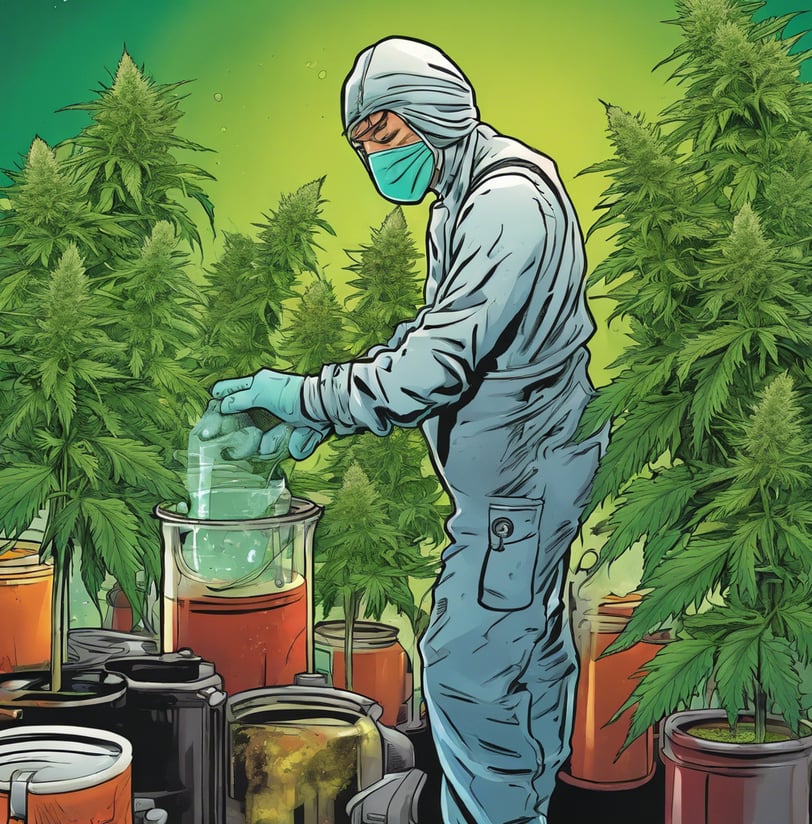Sustainable Practices in Hydrocarbon Extraction: Environmental Considerations and Solutions
Focusing on sustainability, this post examines eco-friendly practices and solutions for hydrocarbon extraction operations, emphasizing the importance of minimizing environmental impact while optimizing terroir-driven processes.
5/29/20243 min read


Sustainable Practices in Hydrocarbon Cannabis Extraction: Environmental Considerations and Solutions
The cannabis industry has witnessed remarkable growth in recent years, driven by the increasing acceptance and legalization of cannabis for medical and recreational use. A crucial aspect of this industry is the extraction of cannabinoids from cannabis plant matter to create concentrates and extractions. Hydrocarbon extraction is a widely used method for this purpose. However, like all industrial processes, it raises environmental concerns. This blog post delves into sustainable practices in hydrocarbon cannabis extraction, emphasizing the importance of minimizing environmental impact while optimizing terroir-driven processes.
Cannabinoid extraction using hydrocarbons, such as butane or propane, is highly effective in producing high-quality concentrates. However, it involves significant environmental challenges, including solvent management, energy consumption, and waste generation. By implementing sustainable practices, the cannabis industry can address these issues and contribute to a healthier planet.
Hydrocarbon extraction involves using solvents like butane or propane to dissolve cannabinoids and terpenes from the cannabis plant material. The solvent is then evaporated, leaving behind a potent concentrate. This method is favored for its efficiency and the purity of the extracts it produces. However, it necessitates careful handling and disposal of solvents to prevent environmental harm.
Environmental Considerations in Hydrocarbon Extraction
Closed-Loop Systems: Utilizing closed-loop extraction systems can significantly reduce solvent emissions. These systems recycle the solvents, minimizing the release of volatile organic compounds (VOCs) into the atmosphere.
Solvent Recovery: Efficient recovery and reuse of solvents can lower the environmental footprint of extraction operations. Advanced recovery technologies can capture over 99% of the solvents used.
Energy-Efficient Equipment: Investing in energy-efficient extraction equipment can reduce the overall energy consumption of the process. Modern extraction machines with improved energy profiles help in lowering the carbon footprint.
Renewable Energy Sources: Powering extraction facilities with renewable energy sources, such as solar or wind, can further enhance the sustainability of the operation.
Proper Disposal: Ensuring the proper disposal of waste materials, including spent plant matter and contaminated solvents, is crucial. Partnering with certified waste management companies can help in managing hazardous waste responsibly.
Composting and Recycling: Exploring composting options for organic waste and recycling programs for packaging materials can further reduce the environmental impact.
Terroir-Driven Processes in Cannabis Extraction
Terroir refers to the unique environmental conditions in which a plant is grown, including soil, climate, and cultivation practices. In the context of cannabis, terroir can influence the cannabinoid and terpene profile of the plants, affecting the quality and characteristics of the extracts.
Sustainable Cultivation: Implementing sustainable cultivation practices, such as organic farming, water conservation, and soil health management, can enhance the quality of cannabis plants and reduce environmental impact.
Localized Extraction Facilities: Establishing extraction facilities close to cultivation sites can reduce transportation emissions and preserve the integrity of terroir-specific profiles.
Innovations in Sustainable Extraction
Supercritical CO2: Supercritical CO2 extraction is a greener alternative to hydrocarbon solvents. It uses carbon dioxide under high pressure and temperature to extract cannabinoids, resulting in a solvent-free product with minimal environmental impact.
Ethanol Extraction: Ethanol is another eco-friendly solvent that can be used in cannabis extraction. It is less toxic and can be recovered and reused, making it a sustainable choice.
Membrane Filtration: Advanced filtration technologies, such as membrane filtration, can improve the efficiency of solvent recovery and reduce waste generation.
Adsorbent Materials: Using adsorbent materials to capture impurities and contaminants can enhance the purity of extracts while minimizing environmental harm.
Sustainable practices in hydrocarbon cannabis extraction are essential for minimizing environmental impact and ensuring the long-term viability of the industry. By adopting eco-friendly technologies, optimizing terroir-driven processes, and prioritizing solvent and waste management, the cannabis industry can produce high-quality extracts while safeguarding the planet. As the demand for cannabis products continues to rise, integrating sustainability into every aspect of the extraction process will be crucial for a greener future.
Embracing these practices not only benefits the environment but also enhances the reputation and marketability of cannabis products, appealing to an increasingly eco-conscious consumer base.
Contacts
bart@smokyb420.com
(+27) 084-717-2943
